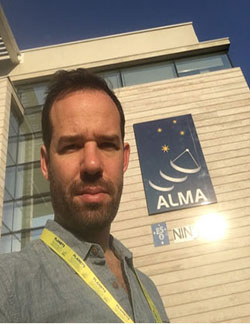
Department
School
Expertise
Biography
Dr. Martin Cordiner joined the Physics Department at Catholic University of America in March 2009. He works full-time on scientific research in astrochemistry and planetary science at the NASA Goddard Space Flight Center, in the Astrochemistry Laboratory.
He studied for a Master in Science (Physics) degree at Bristol University (UK) in 2001 and obtained his PhD in astrochemistry from The University of Nottingham (UK) in 2006. His research aims to understand the chemical conditions responsible for the origin of chemical complexity, including life in the universe.
Research Interests
Studies of the chemical composition of Solar System bodies; the evolution of matter from interstellar clouds to planet-forming environments; the development of molecular complexity and its role in the origin of life. This is achieved via high-resolution radio/sub-mm spectroscopy; radiative transfer modeling of gas-phase molecular emission; gas-phase chemical kinetic simulations.
NASA biography: https://science.gsfc.nasa.gov/sed/bio/martin.cordiner
Current Projects
- Observations of Solar System bodies and Interstellar clouds at mm/sub-mm wavelengths
- Radiative Transfer Modeling of cometary and planetary atmosphers
- Isotopic studies of comets and icy moons
- Investigations of the chemical compostion of Venus's atmosphere
Other Activities
Dr. Cordiner was born in the UK and came to live in America in 2009. He likes to explore the great outdoors - by bike, on foot, or by canoe. He loves music and is currently learning to play the Harmonica and Djembe, but in another life he was a hip-hop DJ.
In the Media
ALMA Reveals Unusual Composition of Interstellar Comet 2I/Borisov (NRAO/ALMA) - April 20, 2020- https://public.nrao.edu/news/alma-reveals-unusual-composition-of-interstellar-comet-2i-borisov/
Hubble Finds Tiny “Electric Soccer Balls” in Space, Helps Solve Interstellar Mystery (NASA) - July 25, 2019 - https://www.nasa.gov/feature/goddard/2019/%5C%5Csoccer-balls-in-space
NASA Finds Moon of Saturn Has Chemical That Could Form “Membranes” (NASA) - July 28, 2017 - https://www.nasa.gov/feature/goddard/2017/nasa-%5C%5Cfinds-moon-of-saturn-has-chemical-that-could-form-membranes/
Comets Forge Molecules in Their Dusty Atmospheres (NRAO) - August 11, 2014 - https://public.nrao.edu/news/comets-alma/
NASA Reveals Alien Composition of 2I/Borisov, 1st Interstellar Comet (NASA)
- https://www.youtube.com/watch?v=NNOb3xrjOhE
